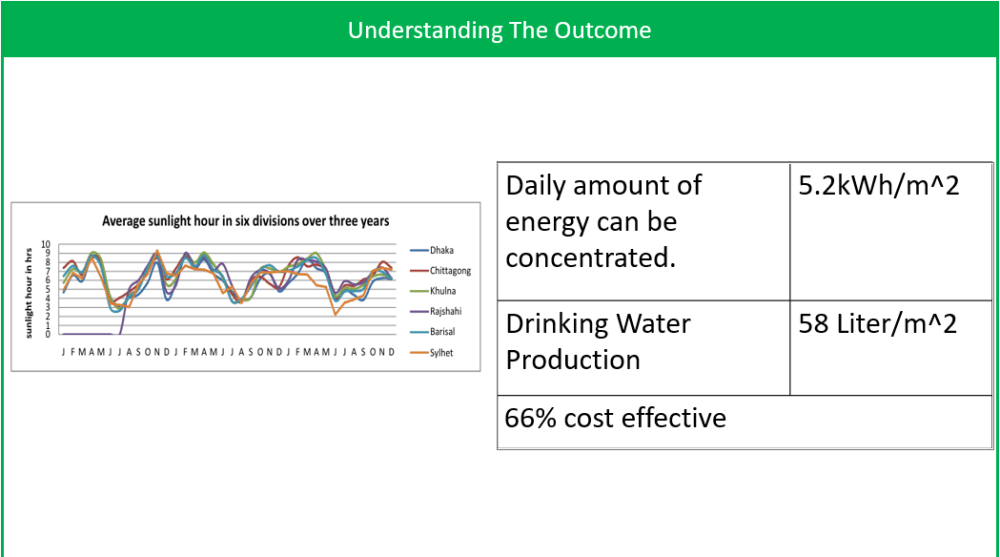The escalating water demand and rising sea levels due to global warming have created a pressing environmental issue in coastal regions of Bangladesh, where the intrusion of saltwater has rendered the available water undrinkable. In light of this challenge, our proposal outlines an innovative approach to address the water scarcity crisis in these vulnerable areas by leveraging renewable solar energy for the desalination process.
The proposed solution incorporates a combination of ancient vaporization and condensation techniques with modern technology, capitalizing on the abundance of solar energy available in Bangladesh. The concept involves the construction of specially designed ponds, strategically located near the Bay of Bengal, to capture tidewater. To ensure maximum utilization of solar energy, a glass dome encloses the upper surface of the pond. Surrounding the glass dome, a series of parabolic mirrors are positioned to concentrate sunlight onto the enclosed area. As solar radiation reaches the dome, the trapped water in the pond absorbs the heat and undergoes vaporization. The resultant vapor, being lighter than air, naturally ascends towards the top of the enclosed dome.
At this stage, the vapor is collected from the dome's apex using a system of pipes and conduits. These pipes are designed to enable condensation of the vapor, facilitated by the cool ambient air surrounding them. By exploiting the temperature difference, the vapor is effectively condensed, yielding fresh and saltless water.
The proposed solar-powered desalination system offers several advantages. Firstly, it relies on renewable solar energy, the largest source of green energy, thus reducing dependency on traditional energy sources and minimizing the system's carbon footprint. Additionally, by employing the ancient technique of vaporization and condensation, the project avoids the high costs associated with conventional reverse osmosis processes. Moreover, the use of local resources, such as seawater and solar energy, ensures sustainability and resilience in the face of climate change. The availability of natural saltwater ponds near the Bay of Bengal provides an ideal foundation for implementing this solution, optimizing the utilization of resources in the coastal regions.
By combining ancient knowledge with modern technology, the solar-powered coastal water desalination system offers a viable and sustainable solution to Bangladesh's freshwater scarcity in coastal areas. The project not only addresses the immediate needs of the affected communities but also establishes a model for other coastal regions grappling with similar challenges worldwide.
With careful implementation and proper maintenance, this solar-powered desalination solution has the potential to alleviate the struggles of marginalized communities, particularly during the dry seasons, by providing them with a reliable source of safe and drinkable water. Moreover, its environmentally friendly nature ensures that future generations can benefit from this innovative approach to combatting water scarcity in a changing climate.
Like this entry?
-
About the Entrant
- Name:Md Mohibur Rahman
- Type of entry:teamTeam members:
- Fahim Ul Haque
- Software used for this entry:Solidworks
- Patent status:none








